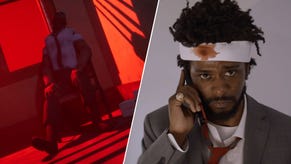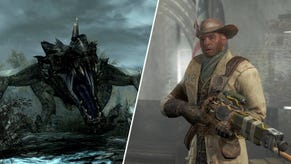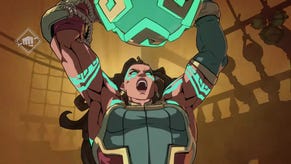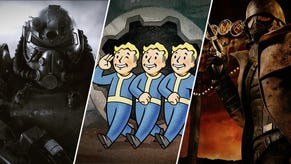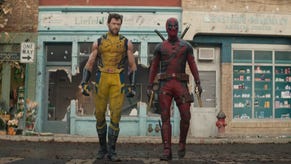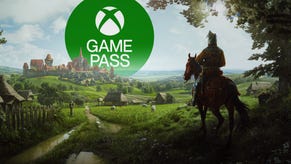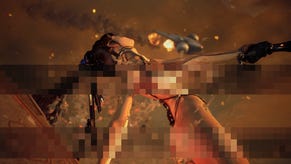The Main Event: Toe-to-toe with THQ's Danny Bilson
According to Danny Bilson, THQ's effervescent core boss, it's time to go big or go home. Ahead of gamescom's start today, he confirms a new third-party signing, hints at Turtle Rock's next game and more.
Danny Bilson is a visionary in waiting. Since joining THQ in 2008, he's overseen major restructuring of the publisher's core output and the signing of the next games of some of the biggest names in development, but his actions are yet to truly come to fruition.
THQ's figures showed heightened losses recently, and many of the biggest stories associated with Bilson's drive to lift the quality of the publisher's core portfolio - titles from the likes of Tomonobu Itagaki and Guillermo del Toro - are still years away. His push with Homefront, billed as Bilson's first real test and breaking into the triple-A big-time, ended in the closure of Kaos and controversy around critical feedback.
Bilson isn't worried. He's clear: the modern core gaming world if about the "event". He's making experiences for which you will gladly pay $60, and everything else - with the recent shelving of the Red Faction IP being a prime example - must be cut out in the name of focus.
I spoke to the straight-talking executive on the phone last week ahead of THQ's showing at gamescom 2011, which kicks off today.
VG247: What were you setting out to achieve when you first started at THQ?
Danny Bilson: When I first started I was brought in as a creative VP to improve the quality of all the games across the portfolio. This was three-and-a-half years ago. There were 17 studios, I believe, and some of them didn't have greenlit projects.
I spent the first six weeks of my job here running around those studios, getting them started on some interesting projects, but the first big restructuring hit the company and we closed a bunch of them, including all the studios I was working on.
I was brought in as a creative leader to help support the studios to get to a higher quality of product.
You've made some pretty significant changes since you've been in your role. If I can just talk about your general strategy first of all. You've just reported your first quarter results; Brian [Farrell, president of THQ] said he was disappointed in performance. Your sales are up, but you've extended your losses because there's been a lot of restructuring. I know you personally favour the long-term approach to development, where you make a considerable investment over time in an effort to pull back the highest possible quality, but when do you think this investment will really pay off? Are you able to keep the release schedule full enough to off-set these losses?
"We're transitioning from what the company was, in terms of kids licensed games and a few interesting core games, to really the only place left in the world for console games: event entertainment. Anything in the mid-range doesn't seem to work. To go forward, we have to create events, just like EA, Activision and Ubi do. There's no place for a mid-range game."
The answer is yes, but "full enough" isn't about how many games we have; it's about how many successful games we have. Especially with a company our size, it really only takes one or two breakthroughs a year to turn this whole place around.
I'm disappointed in the results on the three titles we shipped out of our group this year in different ways. I have different levels of disappointment for each one. For everything that doesn't work, we're certainly always learning.
We're absolutely a company in transition. We're transitioning from what the company was, in terms of kids licensed games and a few interesting core games, to really the only place left in the world for console games: event entertainment. Anything in the mid-range doesn't seem to work, and the world is changing rapidly. It's really come to that, and I think we all understand that here: to go forward, we have to create events, just like EA, Activision and Ubi do. There's no place for a mid-range game. Will we always succeed? That's really hard to do in any entertainment business, but with a couple of large successes it could turn us around.
We're looking forward with a lot of excitement to Saints Row in November, and that's a really big bet for us, I'd say our largest bet since Homefront in terms of how much we spent on marketing and how much we invested. We have very high hopes for it. It's tracking really well in terms of pre-orders and pre-sale in America, the UK and some of the other territories.
We've got some months to go, and the team's still finishing it, but it's a very unique game, and it stands on its own against the competition; there's really nothing else like it. It's a big game which has a lot of value for the player.
And we're feeling really good about the two wrestling games we have this year, WWE and UFC. They're really solid. Both big upgrades from the last ones, and they have some interesting marketing.
It's interesting what you said there about there being no space any more for those middle-ground, double-A products.
Yeah.
It reminds me of something Bobby Kotick would come out with. He built his company on these large pillar franchises: is that how you intend to move forward with THQ?
Yeah, I think that's all we can really do. It's not just Activision or us; look at what EA's doing on consoles. Outside of sports you're only really hearing about one title, basically, which is Battlefield. I'm personally excited about.
Apart from that I think they have Need for Speed, and they have an RPG and, of course, the MMO, but it's not like the old days where you look at a catalogue of everything coming. There are really few games, and those games have to be really high quality events to get gamers to go out and spend their $60.
There's a lot more interactive entertainment around, and I think the core gamer is careful. There are a lot of great titles this fall – probably six or eight that I personally want to buy, that core gamers are excited about – but they're all what I'd call triple-A events: anything in the middle we're not talking about.
We have to really shift our strategy to less games and bigger investment on every level; on resource, time, talent, cash and marketing. That's where you're going to see us headed, on focusing and, of course, learning from our mistakes.
I'm not going to pretend that we haven't been disappointed with performance of some of the products. In the past, those products were pretty good, but pretty good doesn't cut it. This is very internal, but coming out of E3, I said, "You know what? We've really improved THQ, and we're really pretty good now, but it's not good enough. We have to be awesome. And we have to be awesome to compete with those other guys."
I think what you'll see in the coming months is more and more focus - which is the key word around here – on less titles in core, but much more careful rigour around how they're built and how they're brought to market.
If we're talking about THQ becoming more focused, the natural progression is to move onto Red Faction. When titles or series start to underperform, will you continue to be just as ruthless in making sure they don't carry on?
"The Turtle Rock game we'll probably talk about next year. It's well underway. It's fantastic. It's one of the most incredible designs that's ever come across my desk. Really excited about that. It has some mechanics in it and gameplay that you haven't really played before."
We only have so much capital to invest, and we're going to invest in the ones that work. Personally, I worked really hard on trying to bring Red Faction from Guerrilla to a larger success state, and it went in the opposite direction. Even though the critics like Guerrilla, it didn't really sell at the levels we needed it to.
Armageddon was already well into production when Guerrilla shipped, and they'd already made the decision to go underground to improve the visual quality. We really did everything we could to make a great game in response to the other one. I think it's really a pretty good game, but look at the big games, the really big events: how many features and modes do you get in the box for $60? You can have a 10, 12, 14-hour single-player game with some minimal online modes, and I don't think that's going to cut it. I think you have to go bigger and give the gamers really a lot of value for their money. That's all part of the formula for creating an event, not just great IP and great production.
Like, great value, in terms of what's in the package can mean more production, more modes and more variety. Look at the amount of modes in Halo, or even Call of Duty now: you're going to see that kind of robust value in Saints Row for sure.
There's been a real explosion, though, away from gamers spending $60 on products. It'd be easy to argue that the games industry has expanded far beyond selling a $60 game on a disc. I'm thinking specifically to the last EA quarterly call, when Peter Moore said people were spending $50 on average on his Facebook games. I was astonished. Are you seeing similar levels of growth in the social ecosystems surrounding your games?
You have to put that in context. For instance, our UFC game on Facebook, UFC Fight Nation, has more monthly average users than either Madden or Peter Moore's baseball game. I think his FIFA one has more. He may be talking about them seeing an average of people spending $50, but he's not saying how many people are spending $50. If it's a million people, that's really exciting, but his monthly average user figure is under a million on the two games I mentioned. It's all about context around that. Our fanbase on the UFC game monetizes a little more on average.
To get back to your point, which was about other modes of gaming such as Facebook gaming and mobile gaming: I think that stuff is really important. I find myself spending a lot of time playing those, and whether you're playing for free or you're spending any money, you're investing your hours in places other than console games. How many hours does the individual have for gaming entertainment? If half of it is free to play, where you're spending nothing or very little, that's half the console games you used to buy. Look at it that way.
I don't know if "concerned" is the right word, but I think I'm aware of the fact that there's lots of ways to play besides consoles, which takes us back to the idea that only events are going to work as must-plays. It's like blockbuster movies: I think those are the only ones that make all the money these days, and I think it's very similar in the games business. We're focusing our console strategy around that.
We are putting a lot more focus on those other platforms, and we'll be talking more about that in the coming months. You can't avoid them. They're a big part of the gaming ecosystem.
You've had a fantastic few years on the third-party front, and I think it'd be churlish to say otherwise. You've signed the Turtle Rock product, Devil's Third and plenty of others. Can we expect even more, or are you done for now?
We're going to announce one more for sure by the end of this year.
Cool.
But I said we have to focus. Beyond that, we're pretty well set for the next three years going forward. The Turtle Rock game we'll probably talk about next year. It's well underway. It's fantastic. It's one of the most incredible designs that's ever come across my desk. Really excited about that. It has some mechanics in it and gameplay that you haven't really played before.
Patrice Désilets has started in Montreal. He's been there for about two months now, and he's set out on his journey of building his game. I know what it is. It's very cool, and it's in the realm of what you'd expect from Patrice, for sure. He's not really going off from what he's succeeded with before. It's really neat.
Itagaki-san's game, of course, we talked a little bit about. We're adding more and more features to that game to make sure it's really, really epic.
And then we have one more new one, which I think we'll probably announce around December. Not for sure, but that one's well underway also. It's pretty exciting, with some major, major, major talent that you'll recognize.
Otherwise, we're pretty well loaded up, because we've got Guillermo del Toro's game underway at Volition as well. And then we have Saints Row going forwards, and we're expecting to stick with that; Darksiders 2 is coming next June; the new Metro's coming next summer, which, I think, is terrific; and everything I'm talking about has the potential to be in that category of event entertainment.
Is the Turtle Rock game an FPS?
I don't think I'm supposed to say anything about it. Marketing will kill me.
PR: No.
It's OK. I have to ask.
You know what they've done before?
Right.
Right.
Is the development of inSANE still on track for 2013?
Calendar 13, probably yes. But we're not going to ship it until it's unbelievably awesome. We haven't talked abut what it is too much, so I can't say, but I have seen some of the assets come alive. They were designed by Guillermo's designers, who do his movies stuff. I saw them in 2D, and when they put them in 3D I was kind of blown away. You didn't know how it was going to translate and it translates really well. We'll be talking about the specifics of that game probably next year. But I'm really happy with that.
If I wasn't happy with something we wouldn't be talking about it. Everything I've talked about so far I'm really happy with, but if something in the course of production isn't tracking to be competitive in this modern world, it probably won't see the light of day. We just can't do that. We can only get them to that super high quality event level. I'm talking about recent learning. We just have to go further, honestly.
If you're slowing down on your third-party signing stage, do you see this as part of the development of the new THQ coming to a close?
No. It's coming to a pause in a sense that we've loaded up the deck for the next three years. Maybe half of them will sequel. A year from now if we have this conversation, I could be saying, "Well, we've just signed X." I'm looking into our fiscal '15 now, which is 2014 and 2015, and starting to think about what we might need.
There is actually one more. There's not just one, there's one more project that we're about to start pre-production on that we haven't announced.
Again, we really only need one great, incredible event game per quarter. Aside from our commitments to the WWE and the UFC, we really only need one per quarter.
You're talking about plans for the next three years. A lot's been announced for calendar '13, and so on: is this the barrier against which you're expecting to see new hardware come in from Microsoft and Sony? Around 2014?
"Patrice Désilets has started in Montreal. He's been there for about two months now, and he's set out on his journey of building his game. I know what it is. It's very cool, and it's in the realm of what you'd expect from Patrice, for sure. He's not really going off from what he's succeeded with before. It's really neat."
I mean, I don't know. And I'm being honest with you. I keep asking, and I keep not getting clear answers.
The new hardware will just put less restrictions on the games, on mostly graphics and memory. We're already building them with more online features, trying to bring in concepts of more social functionality in our console games, which I think is really interesting. Things like, the more of your friends are playing the more stuff unlocks for you. Some of those things are really neat and important innovations in gaming that we've seen in the Facebook world, and I want to bring some of that to the consoles, just as some of my partners are at the other companies.
But the answer the question about new hardware? As soon as we hear we'll make the call about what games are on the fence, and they'll either be exclusive to the new hardware or they'll cross the line and be on current hardware and enhanced for the new hardware. That's not really a big challenge, because these games are very ambitious anyway.
Are you excited about Wii U, or do you see it as just another box to tick?
No, I'm excited about it. I like the controller quite a bit. We're committed to that platform, so long as our developers find really interesting ways to use the controller so that it's a unique experience and much more than a port.
Obviously, even to port some of the stuff over could be very profitable, but we're really looking to use it. I mean, Darksiders 2 has a very deep loot and inventory system, and having that live and not having to click out of your screen is really a bonus in a game like that. And that's just one really simple example. Some of the two-player stuff in the living room on independent screens where you can't see each other is another one.
And then there's the things you can do with motion sensors, and using the screen as a window – there's all kinds of fun stuff. Even Nintendo had some fun stuff at E3 in their demo, throwing stuff from that screen to the other screen, things like that. You're going to see that in a bunch of our core games. As many as it makes sense.
You don't seem to be too hot on Kinect. We haven't seen too much of core gaming on Kinect yet at all, but are you excited about it? You don't seem to be doing too much for it.
"We have one more new one, which I think we'll probably announce around December. Not for sure, but that one's well underway also. It's pretty exciting, with some major, major, major talent that you'll recognize."
I'm excited about Kinect for the kids-family-casual group. I think they should be putting everything they've got on Kinect: it makes sense. As far as core gaming goes, as it adds to the experience for the core gamer, we will do things. We're maybe doing a few things with voice, but we're not going to do anything to get that extra support from Microsoft if it's not best for the game.
We really just go from the game out. If we can find some ways to do interesting things that are additive to the experience, we would do it. I'm a fan of it for family, multiplayer kids stuff, but we're not like Ubisoft when they're saying that every Ghost Recon game's going to have Kinect features. We're not making those kind of commitments.
I do need to talk about Homefront a little.
Sure.
You personally bigged that game up a great deal, and you backed it heavily with marketing. It would be fair to say that it didn't perform very well critically, and eventually you had to close Kaos. Were you personally disappointed with the way all that turned out?
Yes. I knew some aspects of the game weren't 100 percent competitive with the best in class, but there were other places where I thought it was better. As far as the reviews go, I have to really say that the reviews were mixed. Metacritic takes all your good reviews and trashes them. That's what it does. We had 40 reviews over 80 percent: 40 of them. If some heavily-weighted sites trash you, that becomes the whole story.
More important is the game and people's experience with it. There were two things about Homefront: yes, the single-player should have been longer, and we kind of got wind of that too late to affect it. People were banging through it faster than we thought.
But It was never really about that as a foremost thing; I was always really big on the multiplayer, which I think is a terrific game, but we had issues in our network code which gave us a very rough launch. That was incredibly disappointing to me. You'll never see us do a game without a live beta again. No matter what date we have to crush, as long as I'm here we won't put out an online-centric game without a live beta, so we can work out those bugs in advance.
"You'll never see us do a game without a live beta again. No matter what date we have to crush, as long as I'm here we won't put out an online-centric game without a live beta, so we can work out those bugs in advance."
It took longer than I would have liked to fix it. Obviously, it's all really well-fixed and cleaned up now, and it's terrific. I still maintain it's a really fun online battlefield, but it took too long to correct some of those errors in the network code and we lost a lot of our groundswell.
And yes, it was incredibly disappointing for me. I learned a lot from it, because there were a lot of really good things in it. It appealed to a wide variety of people and fans. I wasn't unaware that if we were going into the world of the Call of Duties and the Battlefields we weren't going to be compared to them; you don't get a pass because it's your first one, and you don't get a pass because you're THQ, or anything like that, and the team knew that. I was always telling them that, if they weren't always telling themselves that. And I think we were 80 percent of where we needed to be. I think we were criticsed as if we were 50 percent of where we needed to be. There was all kinds of learning that went on with that.
I think the network problem was the most severe, because once you have a community rallying around a game and you can't service them properly, you're going to lose them fast. You have to repair it faster than we repaired it. You'll never see a situation like that again at this company.
If Homefront was 80 percent of where you wanted to be, is Homefront 2 going to be 100?
Yes. There'll be some announcements about Homefront 2 that I think will instill a lot of confidence.
THQ will show Saints Row: The Third, Darksiders II, Warhammer 40k: Space Marine, Metro: Last Light, WWE ’12 and UFC Undisputed 3 at gamescom in Cologne this week. Hit this for full details.






